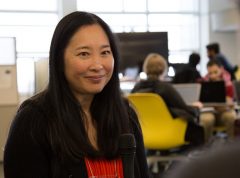On Tuesday, December 5, 2017 CFICE presented Students in the Community: Models of Student Community Engagement. Moderated by Nadine Changfoot, the webinar had presenters, Robert (Bobby) Hackett, Eileen O’Connor, and Stephen Hill discussing several different models for integrating student training and engagement throughout their university careers. Designed for a beginner audience, this webinar touched on the following:
- The Bonner Student Development model (USA)
- University of Ottawa’s various models of engagement
- Trent University’s embedded research assistantships
If you missed out on the day-of presentation, not to worry. We’ve made it accessible below. You can also check out the presenters’ PowerPoint presentations and associated resources below!
Resources:
The following items were shared by the presenters:
- Robert (Bobby) Hackett’s presentation slides (PDF)
- Bonner Program Resource Database
- Eileen O’Connor’s presentation slides (PDF)
- Stephen Hill’s presentation slides (PDF)
Presenters:
 Robert (Bobby) Hackett joined the Bonner Foundation in 1992 as Vice President and Director of the Bonner Scholars Program and assumed the role of President in July, 2010. Prior to joining the Bonner Foundation, Bobby worked at the Telesis Corporation, an affordable housing developer in Washington, D.C. He also served as managing director of the Campus Outreach Opportunity League (COOL) during its first three years of operation. In addition, for the past twenty years, Bobby has been associated in various capacities with the Youth Policy Institute, a Washington, D.C.-based non-partisan organization that researches and reports on policies and programs relating to young people. Bobby received his bachelors degree from Harvard University in 1985 and a masters in public and private management from Yale University’s School of Organization and Management in 1990.
Robert (Bobby) Hackett joined the Bonner Foundation in 1992 as Vice President and Director of the Bonner Scholars Program and assumed the role of President in July, 2010. Prior to joining the Bonner Foundation, Bobby worked at the Telesis Corporation, an affordable housing developer in Washington, D.C. He also served as managing director of the Campus Outreach Opportunity League (COOL) during its first three years of operation. In addition, for the past twenty years, Bobby has been associated in various capacities with the Youth Policy Institute, a Washington, D.C.-based non-partisan organization that researches and reports on policies and programs relating to young people. Bobby received his bachelors degree from Harvard University in 1985 and a masters in public and private management from Yale University’s School of Organization and Management in 1990.
 Eileen O’Connor is an Associate Professor in the School of Human Kinetics. She obtained her PhD in History, and was a postdoctoral fellow in Health Sciences, University of Ottawa (2004). Dr. O’Connor was interim-Director of the Research Centre for Sport in Canadian Society (RCSCS) at uOttawa 2014-2015, and is member of several research groups on the history of health, sport or gender studies. She is an engaged scholar in the field of experiential learning and sits on the academic advisory committee of the Centre Michaëlle Jean for Global and Community Engagement at uOttawa, the advisory board of the Work-Integrated Learning toolkit supported by the Higher Education Quality Council of Ontario (HEQCO), and through community-based research projects such as CFICE. Eileen is recipient of an Excellence in Teaching Award from the Faculty of Health Sciences in 2007; the uOttawa Community Service Learning, Outstanding Achievement Professor Award in 2009; an OCRI National Capital Educator’s Award in 2010 and a uOttawa Excellence in Education Prize in 2016. She holds the 2017-2020 TLSS Chair in University Teaching from the University of Ottawa, with a focus on Work-Integrated Learning.
Eileen O’Connor is an Associate Professor in the School of Human Kinetics. She obtained her PhD in History, and was a postdoctoral fellow in Health Sciences, University of Ottawa (2004). Dr. O’Connor was interim-Director of the Research Centre for Sport in Canadian Society (RCSCS) at uOttawa 2014-2015, and is member of several research groups on the history of health, sport or gender studies. She is an engaged scholar in the field of experiential learning and sits on the academic advisory committee of the Centre Michaëlle Jean for Global and Community Engagement at uOttawa, the advisory board of the Work-Integrated Learning toolkit supported by the Higher Education Quality Council of Ontario (HEQCO), and through community-based research projects such as CFICE. Eileen is recipient of an Excellence in Teaching Award from the Faculty of Health Sciences in 2007; the uOttawa Community Service Learning, Outstanding Achievement Professor Award in 2009; an OCRI National Capital Educator’s Award in 2010 and a uOttawa Excellence in Education Prize in 2016. She holds the 2017-2020 TLSS Chair in University Teaching from the University of Ottawa, with a focus on Work-Integrated Learning.
 Stephen Hill is an associate professor in the School of the Environment at Trent University. He’s interested in understanding policies and actions for preventing climate change, particularly how we produce and consume low-carbon energy. He is also involved in community-based research and work. Stephen spent nearly a decade studying and working in Alberta before finding his home at Trent University. He was the 2011 winner of the T.H.B. Symons Award for Excellence in Teaching and the 2011 winner of the CMHC Excellence in Education Award (Sustainable Practices). He’s a social scientist but approaches his research and teaching from an interdisciplinary perspective. His background spans a range of fields including a post-doctoral fellowship in the Haskayne School of Business (University of Calgary), a PhD in environmental science from the Faculty of Environmental Design (University of Calgary), and undergraduate degrees in chemical engineering (Queen’s) and biology (Queen’s). He is also a registered professional engineer in the province of Ontario.
Stephen Hill is an associate professor in the School of the Environment at Trent University. He’s interested in understanding policies and actions for preventing climate change, particularly how we produce and consume low-carbon energy. He is also involved in community-based research and work. Stephen spent nearly a decade studying and working in Alberta before finding his home at Trent University. He was the 2011 winner of the T.H.B. Symons Award for Excellence in Teaching and the 2011 winner of the CMHC Excellence in Education Award (Sustainable Practices). He’s a social scientist but approaches his research and teaching from an interdisciplinary perspective. His background spans a range of fields including a post-doctoral fellowship in the Haskayne School of Business (University of Calgary), a PhD in environmental science from the Faculty of Environmental Design (University of Calgary), and undergraduate degrees in chemical engineering (Queen’s) and biology (Queen’s). He is also a registered professional engineer in the province of Ontario.
 Nadine Changfoot, Associate Professor in Political Studies at Trent University and graduate faculty in Sustainability Studies, Canadian and Indigenous Studies, and Theory, Culture, and Politics. She engages in collaborative, participatory research with arts, environmental, disability, and healthcare communities. Her research includes: 1) methods and ethics of arts-based research creation for multimedia storytelling to tackle negative representations of disability and improve accessibility and inclusion; and 2) complex cross-sectoral partnerships that include the state, non-profit sector, and aggrieved communities for neighbourhood influence and environmental stewardship. She was Academic Co-lead of the CFICE Community Environmental Sustainability (Peterborough-Haliburton) hub in Phase I of the project, collaborating with Abbey Gardens, Haliburton Highlands Land Trust, and GreenUP, and continues to participate as part of the Evaluation and Analysis working group.
Nadine Changfoot, Associate Professor in Political Studies at Trent University and graduate faculty in Sustainability Studies, Canadian and Indigenous Studies, and Theory, Culture, and Politics. She engages in collaborative, participatory research with arts, environmental, disability, and healthcare communities. Her research includes: 1) methods and ethics of arts-based research creation for multimedia storytelling to tackle negative representations of disability and improve accessibility and inclusion; and 2) complex cross-sectoral partnerships that include the state, non-profit sector, and aggrieved communities for neighbourhood influence and environmental stewardship. She was Academic Co-lead of the CFICE Community Environmental Sustainability (Peterborough-Haliburton) hub in Phase I of the project, collaborating with Abbey Gardens, Haliburton Highlands Land Trust, and GreenUP, and continues to participate as part of the Evaluation and Analysis working group.